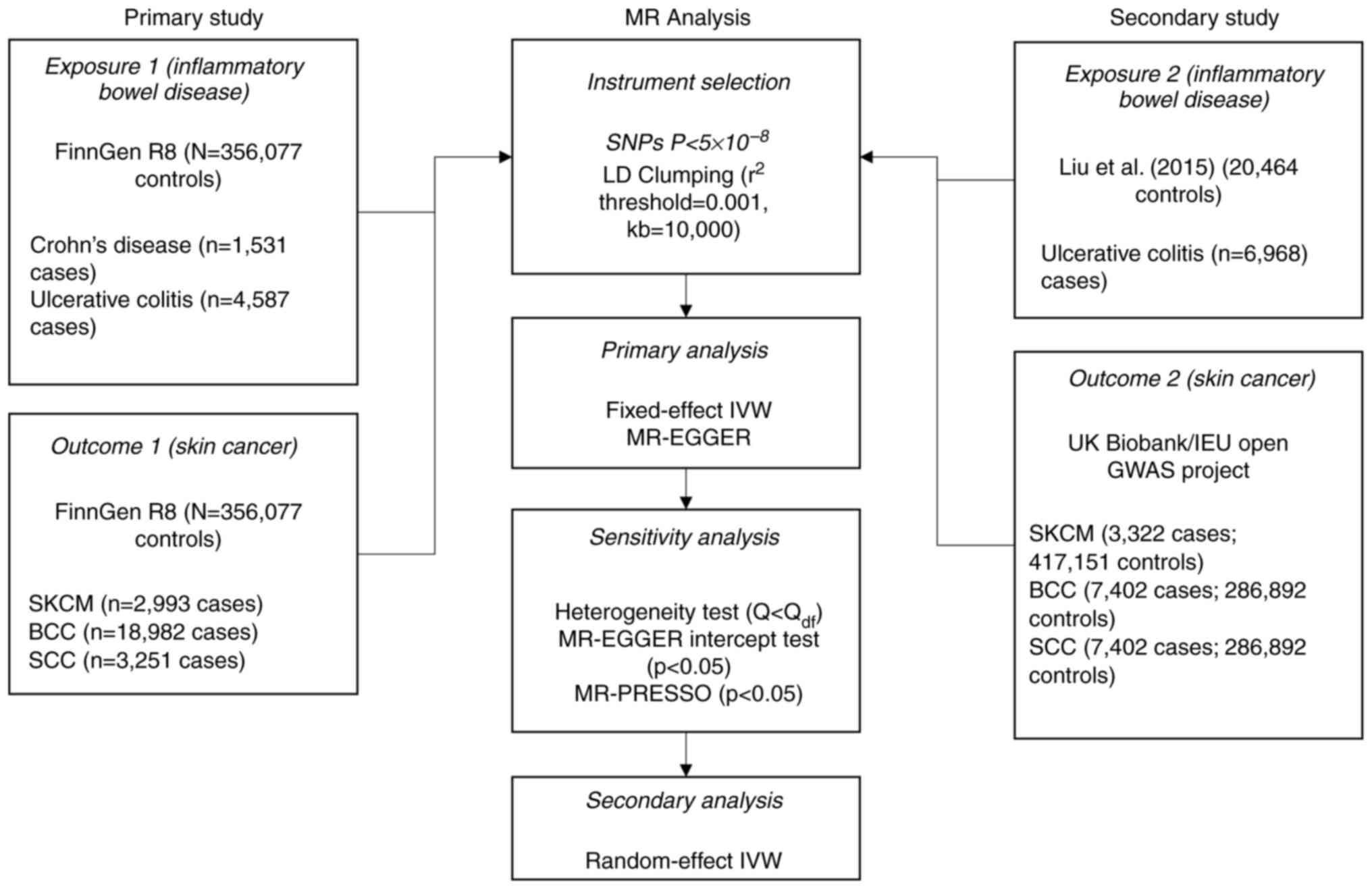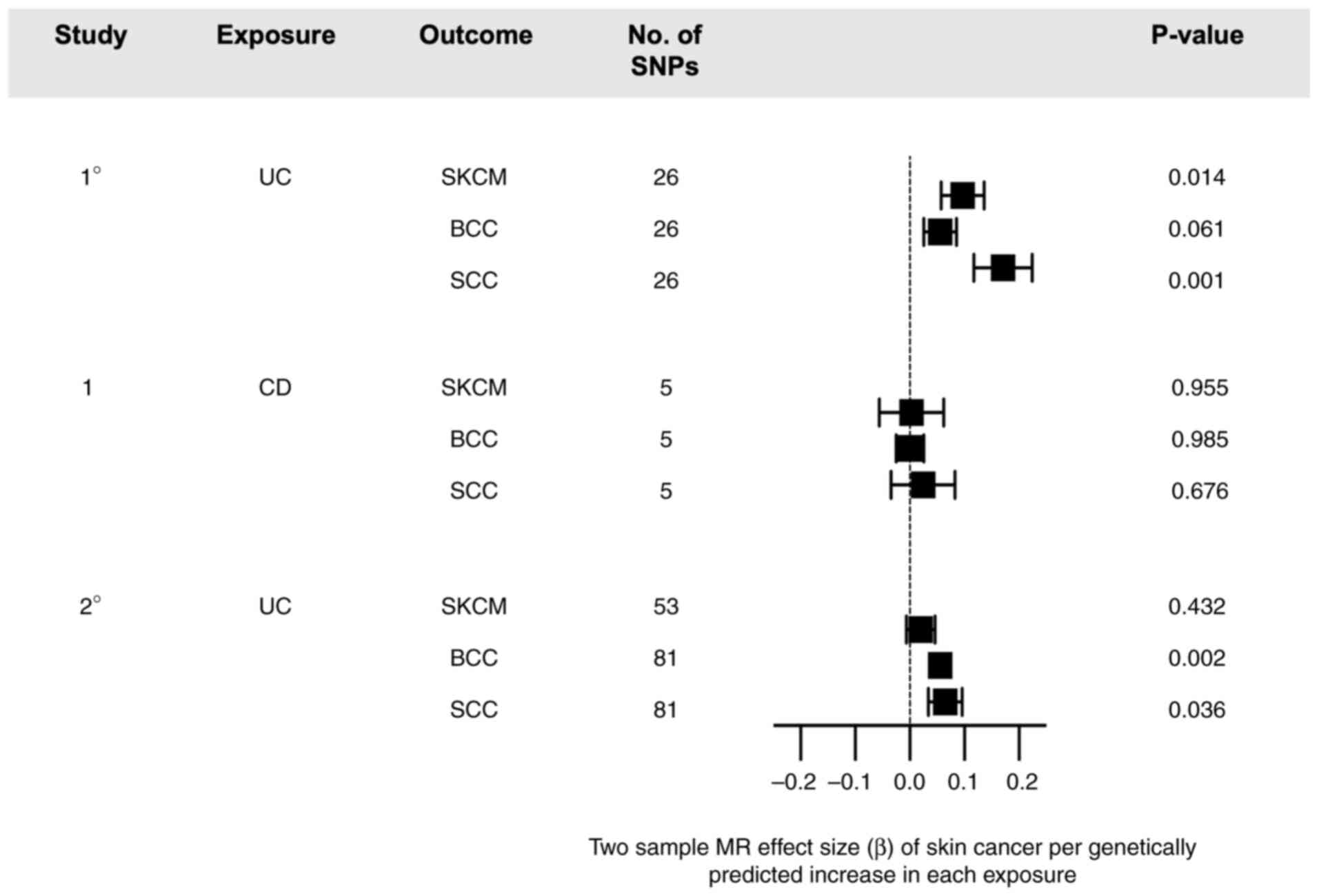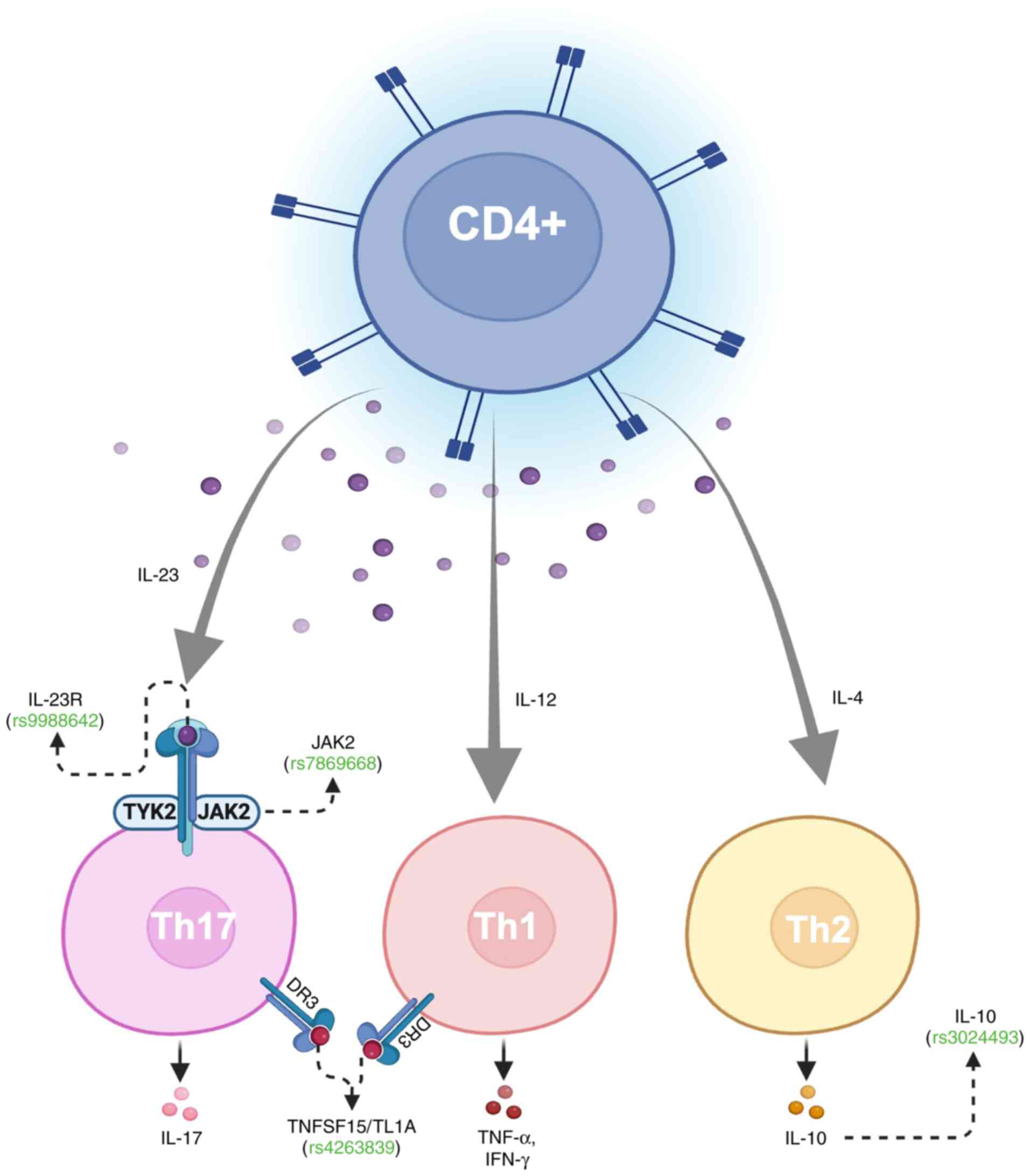|
1
|
Leiter U, Keim U and Garbe C: Epidemiology
of skin cancer: Update 2019. Adv Exp Med Biol. 1268:123–139.
2020.PubMed/NCBI View Article : Google Scholar
|
|
2
|
Burisch J and Munkholm P: Inflammatory
bowel disease epidemiology. Curr Opin Gastroenterol. 29:357–362.
2013.PubMed/NCBI View Article : Google Scholar
|
|
3
|
Ng SC, Shi HY, Hamidi N, Underwood FE,
Tang W, Benchimol EI, Panaccione R, Ghosh S, Wu JCY, Chan FKL, et
al: Worldwide incidence and prevalence of inflammatory bowel
disease in the 21st century: A systematic review of
population-based studies. Lancet. 390:2769–2778. 2017.PubMed/NCBI View Article : Google Scholar
|
|
4
|
Singh S, Nagpal SJS, Murad MH, Yadav S,
Kane SV, Pardi DS, Talwalkar JA and Loftus EV Jr: Inflammatory
bowel disease is associated with an increased risk of melanoma: A
systematic review and meta-analysis. Clin Gastroenterol Hepatol.
12:210–218. 2014.PubMed/NCBI View Article : Google Scholar
|
|
5
|
Narous M, Nugent Z, Singh H and Bernstein
CN: Risks of melanoma and nonmelanoma skin cancers pre- and
post-inflammatory bowel disease diagnosis. Inflamm Bowel Dis.
29:1047–1056. 2023.PubMed/NCBI View Article : Google Scholar
|
|
6
|
Long MD, Herfarth HH, Pipkin CA, Porter
CQ, Sandler RS and Kappelman MD: Increased risk for non-melanoma
skin cancer in patients with inflammatory bowel disease. Clin
Gastroenterol Hepatol. 8:268–274. 2010.PubMed/NCBI View Article : Google Scholar
|
|
7
|
Brem R, Li F and Karran P: Reactive oxygen
species generated by thiopurine/UVA cause irreparable
transcription-blocking DNA lesions. Nucleic Acids Res.
37:1951–1961. 2009.PubMed/NCBI View Article : Google Scholar
|
|
8
|
Lo B, Zhao M, Vind I and Burisch J: The
risk of extraintestinal cancer in inflammatory bowel disease: A
systematic review and meta-analysis of population-based cohort
studies. Clin Gastroenterol Hepatol. 19:1117–1138.e19.
2021.PubMed/NCBI View Article : Google Scholar
|
|
9
|
Liu JZ, van Sommeren S, Huang H, Ng SC,
Alberts R, Takahashi A, Ripke S, Lee JC, Jostins L, Shah T, et al:
Association analyses identify 38 susceptibility loci for
inflammatory bowel disease and highlight shared genetic risk across
populations. Nat Genet. 47:979–986. 2015.PubMed/NCBI View
Article : Google Scholar
|
|
10
|
Marzano AV, Borghi A, Stadnicki A, Crosti
C and Cugno M: Cutaneous manifestations in patients with
inflammatory bowel diseases: Pathophysiology, clinical features,
and therapy. Inflamm Bowel Dis. 20:213–227. 2014.PubMed/NCBI View Article : Google Scholar
|
|
11
|
Long MD, Martin CF, Pipkin CA, Herfarth
HH, Sandler RS and Kappelman MD: Risk of melanoma and nonmelanoma
skin cancer among patients with inflammatory bowel disease.
Gastroenterology. 143:390–399.e1. 2012.PubMed/NCBI View Article : Google Scholar
|
|
12
|
Cushing KC, Du X, Chen Y, Stetson LC,
Kuppa A, Chen VL, Kahlenberg JM, Gudjonsson JE, Vanderwerff B,
Higgins PDR and Speliotes EK: Inflammatory bowel disease risk
variants are associated with an increased risk of skin cancer.
Inflamm Bowel Dis. 28:1667–1676. 2022.PubMed/NCBI View Article : Google Scholar
|
|
13
|
Narayanan DL, Saladi RN and Fox JL:
Ultraviolet radiation and skin cancer. Int J Dermatol. 49:978–986.
2010.PubMed/NCBI View Article : Google Scholar
|
|
14
|
Slominski AT, Slominski RM, Raman C, Chen
JY, Athar M and Elmets C: Neuroendocrine signaling in the skin with
a special focus on the epidermal neuropeptides. Am J Physiol Cell
Physiol. 323:C1757–C1776. 2022.PubMed/NCBI View Article : Google Scholar
|
|
15
|
Rangwala S and Tsai KY: Roles of the
immune system in skin cancer. Br J Dermatol. 165:953–965.
2011.PubMed/NCBI View Article : Google Scholar
|
|
16
|
Kalaora S, Nagler A, Wargo JA and Samuels
Y: Mechanisms of immune activation and regulation: Lessons from
melanoma. Nat Rev Cancer. 22:195–207. 2022.PubMed/NCBI View Article : Google Scholar
|
|
17
|
Tobin DJ: Biochemistry of human skin-our
brain on the outside. Chem Soc Rev. 35:52–67. 2006.PubMed/NCBI View
Article : Google Scholar
|
|
18
|
Tamari M, Ver Heul AM and Kim BS:
Immunosensation: Neuroimmune cross talk in the skin. Annu Rev
Immunol. 39:369–393. 2021.PubMed/NCBI View Article : Google Scholar
|
|
19
|
Liu AW, Gillis JE, Sumpter TL and Kaplan
DH: Neuroimmune interactions in atopic and allergic contact
dermatitis. J Allergy Clin Immunol. 151:1169–1177. 2023.PubMed/NCBI View Article : Google Scholar
|
|
20
|
Slominski RM, Chen JY, Raman C and
Slominski AT: Photo-neuro-immuno-endocrinology: How the ultraviolet
radiation regulates the body, brain, and immune system. Proc Natl
Acad Sci USA. 121(e2308374121)2024.PubMed/NCBI View Article : Google Scholar
|
|
21
|
Slominski RM, Kim TK, Janjetovic Z,
Brożyna AA, Podgorska E, Dixon KM, Mason RS, Tuckey RC, Sharma R,
Crossman DK, et al: Malignant melanoma: An overview, new
perspectives, and vitamin D signaling. Cancers (Basel).
16(2262)2024.PubMed/NCBI View Article : Google Scholar
|
|
22
|
Muralidhar S, Filia A, Nsengimana J,
Poźniak J, O'Shea SJ, Diaz JM, Harland M, Randerson-Moor JA,
Reichrath J, Laye JP, et al: Vitamin D-VDR signaling inhibits
Wnt/β-catenin-mediated melanoma progression and promotes antitumor
immunity. Cancer Res. 79:5986–5998. 2019.PubMed/NCBI View Article : Google Scholar
|
|
23
|
Kovacs D, Migliano E, Muscardin L, Silipo
V, Catricalà C, Picardo M and Bellei B: The role of Wnt/β-catenin
signaling pathway in melanoma epithelial-to-mesenchymal-like
switching: Evidences from patients-derived cell lines. Oncotarget.
7:43295–43314. 2016.PubMed/NCBI View Article : Google Scholar
|
|
24
|
Smith GD and Ebrahim S: ‘Mendelian
randomization’: Can genetic epidemiology contribute to
understanding environmental determinants of disease? Int J
Epidemiol. 32:1–22. 2003.PubMed/NCBI View Article : Google Scholar
|
|
25
|
Liu D, Cao M, Wang H, Cao W, Zheng C, Li Y
and Wang Y: Association between inflammatory bowel disease and
cancer risk: Evidence triangulation from genetic correlation,
Mendelian randomization, and colocalization analyses across East
Asian and European populations. BMC Med. 22(137)2024.PubMed/NCBI View Article : Google Scholar
|
|
26
|
Li A, Yu M, Wu K, Liu L and Sun X:
Inflammatory bowel disease and skin cancer: A two-sample mendelian
randomization analysis. Genet Test Mol Biomarkers. 28:91–99.
2024.PubMed/NCBI View Article : Google Scholar
|
|
27
|
Hemani G, Zheng J, Elsworth B, Wade KH,
Haberland V, Baird D, Laurin C, Burgess S, Bowden J, Langdon R, et
al: The MR-Base platform supports systematic causal inference
across the human phenome. Elife. 7(e34408)2018.PubMed/NCBI View Article : Google Scholar
|
|
28
|
Burgess S, Foley CN, Allara E, Staley JR
and Howson JMM: A robust and efficient method for Mendelian
randomization with hundreds of genetic variants. Nat Commun.
11(376)2020.PubMed/NCBI View Article : Google Scholar
|
|
29
|
Greenland S: An introduction to
instrumental variables for epidemiologists. Int J Epidemiol.
29:722–729. 2000.PubMed/NCBI View Article : Google Scholar
|
|
30
|
Kurki MI, Karjalainen J, Palta P, Sipilä
TP, Kristiansson K, Donner KM, Reeve MP, Laivuori H, Aavikko M,
Kaunisto MA, et al: FinnGen provides genetic insights from a
well-phenotyped isolated population. Nature. 613:508–518.
2023.PubMed/NCBI View Article : Google Scholar
|
|
31
|
Franke A, Balschun T, Karlsen TH,
Sventoraityte J, Nikolaus S, Mayr G, Domingues FS, Albrecht M,
Nothnagel M, Ellinghaus D, et al: Sequence variants in IL10, ARPC2
and multiple other loci contribute to ulcerative colitis
susceptibility. Nat Genet. 40:1319–1323. 2008.PubMed/NCBI View
Article : Google Scholar
|
|
32
|
Wang AH, Lam WJ, Han DY, Ding Y, Hu R,
Fraser AG, Ferguson LR and Morgan AR: The effect of IL-10 genetic
variation and interleukin 10 serum levels on Crohn's disease
susceptibility in a New Zealand population. Hum Immunol.
72:431–435. 2011.PubMed/NCBI View Article : Google Scholar
|
|
33
|
Li MC and He SH: IL-10 and its related
cytokines for treatment of inflammatory bowel disease. World J
Gastroenterol. 10:620–625. 2004.PubMed/NCBI View Article : Google Scholar
|
|
34
|
Kim J, Modlin RL, Moy RL, Dubinett SM,
McHugh T, Nickoloff BJ and Uyemura K: IL-10 production in cutaneous
basal and squamous cell carcinomas. A mechanism for evading the
local T cell immune response. J Immunol. 155:2240–2247.
1995.PubMed/NCBI
|
|
35
|
Enk CD, Sredni D, Blauvelt A and Katz SI:
Induction of IL-10 gene expression in human keratinocytes by UVB
exposure in vivo and in vitro. J Immunol. 154:4851–4856.
1995.PubMed/NCBI
|
|
36
|
Cătană CS, Berindan Neagoe I, Cozma V,
Magdaş C, Tăbăran F and Dumitraşcu DL: Contribution of the
IL-17/IL-23 axis to the pathogenesis of inflammatory bowel disease.
World J Gastroenterol. 21:5823–5830. 2015.PubMed/NCBI View Article : Google Scholar
|
|
37
|
Ganzetti G, Rubini C, Campanati A, Zizzi
A, Molinelli E, Rosa L, Simonacci F and Offidani A: IL-17, IL-23,
and p73 expression in cutaneous melanoma: A pilot study. Melanoma
Res. 25:232–238. 2015.PubMed/NCBI View Article : Google Scholar
|
|
38
|
McAllister F and Kolls JK: Th17 cytokines
in non-melanoma skin cancer. Eur J Immunol. 45:692–694.
2015.PubMed/NCBI View Article : Google Scholar
|
|
39
|
Kamada N, Hisamatsu T, Honda H, Kobayashi
T, Chinen H, Takayama T, Kitazume MT, Okamoto S, Koganei K, Sugita
A, et al: TL1A produced by lamina propria macrophages induces Th1
and Th17 immune responses in cooperation with IL-23 in patients
with Crohn's disease. Inflamm Bowel Dis. 16:568–575.
2010.PubMed/NCBI View Article : Google Scholar
|
|
40
|
Takedatsu H, Michelsen KS, Wei B, Landers
CJ, Thomas LS, Dhall D, Braun J and Targan SR: TL1A (TNFSF15)
regulates the development of chronic colitis by modulating both
T-helper 1 and T-helper 17 activation. Gastroenterology.
135:552–567. 2008.PubMed/NCBI View Article : Google Scholar
|
|
41
|
He D, Li H, Yusuf N, Elmets CA, Li J,
Mountz J and Xu H: IL-17 promotes tumor development through the
induction of tumor promoting microenvironments at tumor sites and
myeloid-derived suppressor cells. J Immunol. 184:2281–2288.
2010.PubMed/NCBI View Article : Google Scholar
|
|
42
|
Wang L, Yi T, Zhang W, Pardoll DM and Yu
H: IL-17 enhances tumor development in carcinogen-induced skin
cancer. Cancer Res. 70:10112–10120. 2010.PubMed/NCBI View Article : Google Scholar
|
|
43
|
Zou S, Tong Q, Liu B, Huang W, Tian Y and
Fu X: Targeting STAT3 in cancer immunotherapy. Mol Cancer.
19(145)2020.PubMed/NCBI View Article : Google Scholar
|
|
44
|
Zhang J and Yao Z: Immune cell
trafficking: A novel perspective on the gut-skin axis. Inflamm
Regen. 44(21)2024.PubMed/NCBI View Article : Google Scholar
|
|
45
|
Galván-Peña S, Zhu Y, Hanna BS, Mathis D
and Benoist C: A dynamic atlas of immunocyte migration from the
gut. Sci Immunol. 9(eadi0672)2024.PubMed/NCBI View Article : Google Scholar
|
|
46
|
Brauckmann V, Nambiar S, Potthoff A,
Höxtermann S, Wach J, Kayser A, Tiemann C, Schuppe AK, Brockmeyer
NH and Skaletz-Rorowski A: Influence of dietary supplementation of
short-chain fatty acid sodium propionate in people living with HIV
(PLHIV). J Eur Acad Dermatol Venereol. 36:881–889. 2022.PubMed/NCBI View Article : Google Scholar
|
|
47
|
Shi Z, Wu X, Wu CY, Singh SP, Law T,
Yamada D, Huynh M, Liakos W, Yang G, Farber JM, et al: Bile acids
improve psoriasiform dermatitis through inhibition of IL-17A
expression and CCL20-CCR6-mediated trafficking of T cells. J Invest
Dermatol. 142:1381–1390.e11. 2022.PubMed/NCBI View Article : Google Scholar
|
|
48
|
Trompette A, Pernot J, Perdijk O,
Alqahtani RAA, Domingo JS, Camacho-Muñoz D, Wong NC, Kendall AC,
Wiederkehr A, Nicod LP, et al: Gut-derived short-chain fatty acids
modulate skin barrier integrity by promoting keratinocyte
metabolism and differentiation. Mucosal Immunol. 15:908–926.
2022.PubMed/NCBI View Article : Google Scholar
|
|
49
|
Dokoshi T, Seidman JS, Cavagnero KJ, Li F,
Liggins MC, Taylor BC, Olvera J, Knight R, Chang JT, Salzman NH and
Gallo RL: Skin inflammation activates intestinal stromal
fibroblasts and promotes colitis. J Clin Invest.
131(e147614)2021.PubMed/NCBI View Article : Google Scholar
|
|
50
|
Leyva-Castillo JM, Galand C, Kam C, Burton
O, Gurish M, Musser MA, Goldsmith JD, Hait E, Nurko S, Brombacher
F, et al: Mechanical skin injury promotes food anaphylaxis by
driving intestinal mast cell expansion. Immunity. 50:1262–1275.e4.
2019.PubMed/NCBI View Article : Google Scholar
|
|
51
|
Adams DH and Eksteen B: Aberrant homing of
mucosal T cells and extra-intestinal manifestations of inflammatory
bowel disease. Nat Rev Immunol. 6:244–251. 2006.PubMed/NCBI View Article : Google Scholar
|
|
52
|
Grant AJ, Lalor PF, Salmi M, Jalkanen S
and Adams DH: Homing of mucosal lymphocytes to the liver in the
pathogenesis of hepatic complications of inflammatory bowel
disease. Lancet. 359:150–157. 2002.PubMed/NCBI View Article : Google Scholar
|
|
53
|
Salmi M and Jalkanen S: Human leukocyte
subpopulations from inflamed gut bind to joint vasculature using
distinct sets of adhesion molecules. J Immunol. 166:4650–4657.
2001.PubMed/NCBI View Article : Google Scholar
|
|
54
|
Iwata M, Hirakiyama A, Eshima Y, Kagechika
H, Kato C and Song SY: Retinoic acid imprints gut-homing
specificity on T cells. Immunity. 21:527–538. 2004.PubMed/NCBI View Article : Google Scholar
|
|
55
|
Strobl J, Gail LM, Kleissl L, Pandey RV,
Smejkal V, Huber J, Puxkandl V, Unterluggauer L,
Dingelmaier-Hovorka R, Atzmüller D, et al: Human resident memory T
cells exit the skin and mediate systemic Th2-driven inflammation. J
Exp Med. 218(e20210417)2021.PubMed/NCBI View Article : Google Scholar
|
|
56
|
Colombel JF, Sands BE, Rutgeerts P,
Sandborn W, Danese S, D'Haens G, Panaccione R, Loftus EV Jr, Sankoh
S, Fox I, et al: The safety of vedolizumab for ulcerative colitis
and Crohn's disease. Gut. 66:839–851. 2017.PubMed/NCBI View Article : Google Scholar
|













